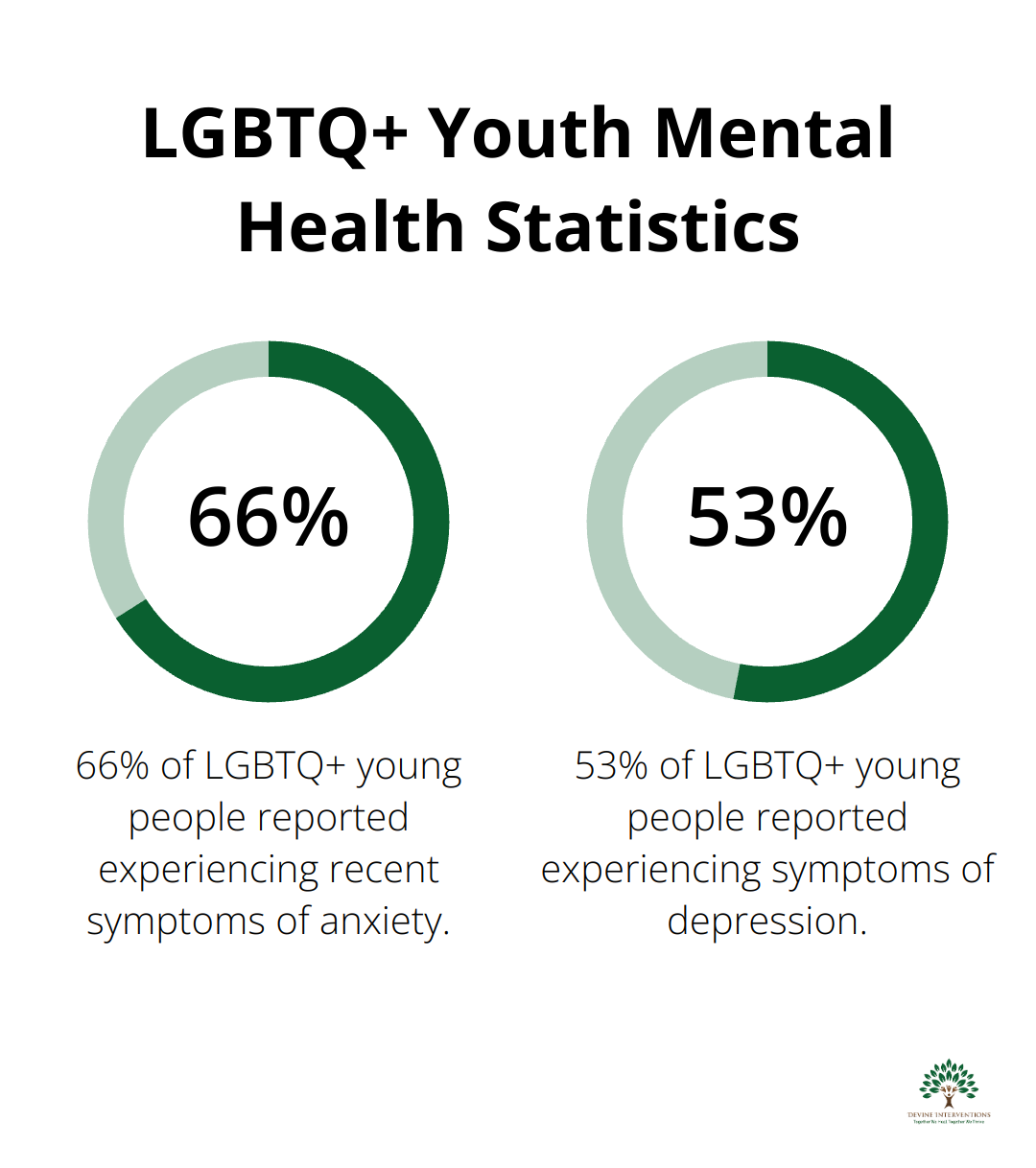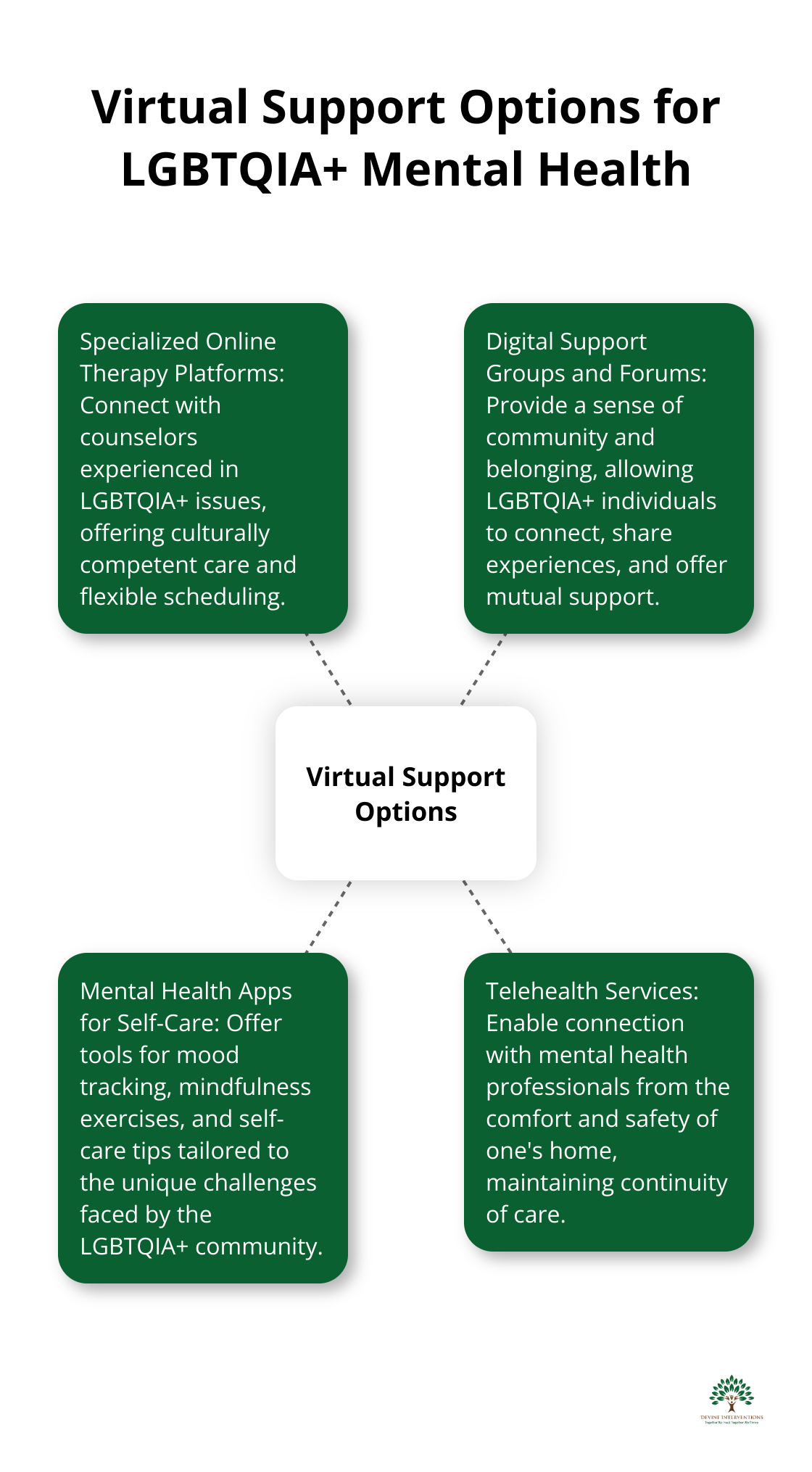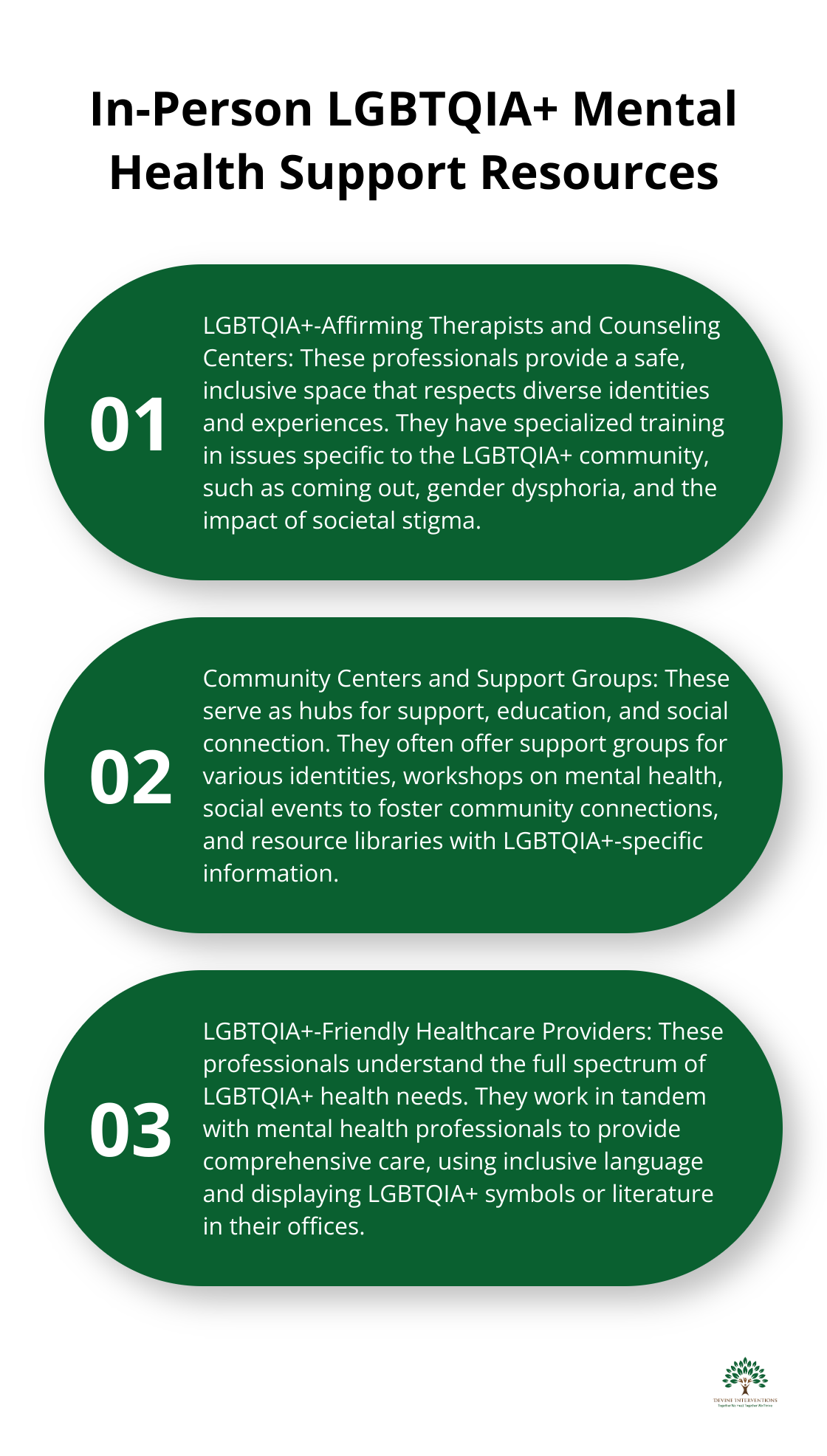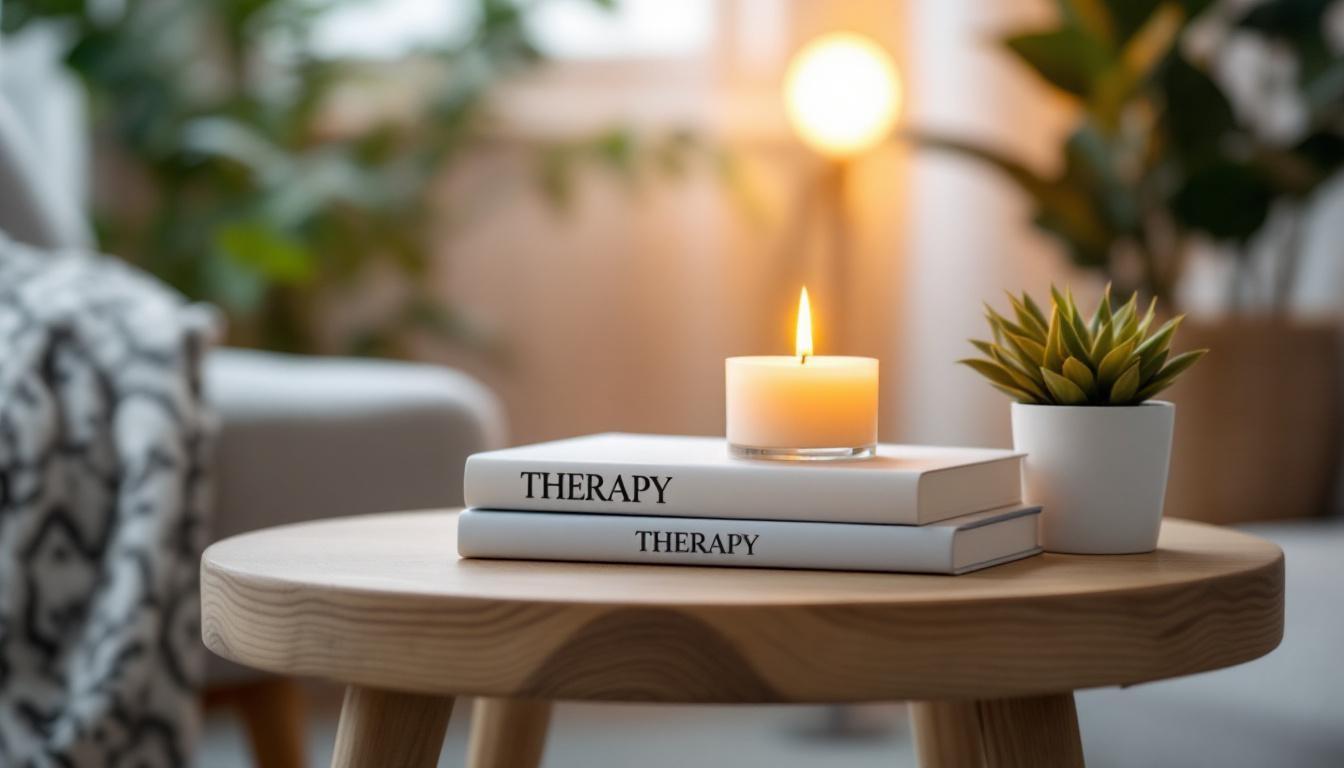At Devine Interventions, we understand the unique mental health challenges faced by the LGBTQIA+ community.
The intersection of LGBTQIA+ identity and mental health is complex, often influenced by societal pressures and discrimination.
This blog post explores both virtual and in-person support options, empowering individuals to take control of their mental well-being.
Mental Health Challenges in the LGBTQIA+ Community
Higher Rates of Anxiety and Depression
The LGBTQIA+ community faces significant mental health challenges. A Trevor Project survey revealed that 66% of LGBTQ+ young people reported experiencing recent symptoms of anxiety, while 53% suffer from depression. These rates surpass those in the general population by a considerable margin.

Societal pressures and discrimination often fuel anxiety and depression. The constant stress of navigating a world that may not fully accept one’s identity takes a severe toll on mental health. This impact extends to daily life, relationships, and overall well-being.
Substance Abuse Concerns
Substance abuse emerges as another critical concern. CDC data highlights that LGBTQ+ young adults (ages 18-25) have higher rates of alcohol use compared to their heterosexual peers. They also show a higher likelihood of marijuana use. These statistics underscore the urgent need for targeted support and intervention.
Identity Exploration and Coming Out
The process of coming out and exploring one’s identity adds another layer of stress. Research indicates that high family rejection during adolescence can increase depression levels and illegal drug use. This finding emphasizes the importance of supportive environments and acceptance (especially within family units).
Discrimination and Social Stigma
Discrimination remains a pervasive issue. LGBTQ+ youth report experiencing discrimination based on their sexual orientation or gender identity. This constant exposure to prejudice can lead to internalized stigma, further exacerbating mental health challenges.
Unique Stressors and Support Needs
The LGBTQIA+ community faces unique stressors that require specialized care. Mental health professionals must provide culturally competent care that addresses the specific needs of this community. A safe, non-judgmental space allows individuals to explore their identities and work through mental health challenges without fear of discrimination.
The combination of these factors creates a complex landscape for mental health in the LGBTQIA+ community. To address these challenges effectively, a multi-faceted approach that combines professional support, community resources, and individual empowerment proves essential. The next section explores the virtual support options available to the LGBTQIA+ community, offering innovative ways to access mental health care and build resilience.
How Virtual Support Boosts LGBTQIA+ Mental Health
The digital age has revolutionized mental health support, offering new avenues for the LGBTQIA+ community to access care. Virtual options provide a lifeline, especially for those who face geographical or social barriers to in-person services.

Specialized Online Therapy Platforms
Online therapy platforms have emerged as game-changers for LGBTQIA+ mental health. These platforms connect individuals with counselors who specialize in LGBTQIA+ issues, ensuring culturally competent care. Pride Counseling, for example, offers a network of therapists experienced in working with the LGBTQIA+ community. Users can choose therapists based on their specific needs and preferences, which fosters a more personalized therapeutic experience.
The convenience of these platforms cannot be overstated. With flexible scheduling and the ability to connect from anywhere, barriers to accessing mental health support decrease significantly. This proves particularly crucial for individuals in rural areas or those not yet out to their families.
Digital Support Groups and Forums
Virtual support groups and forums provide a sense of community and belonging, which is vital for mental well-being. TrevorSpace (an online community by The Trevor Project) serves as an excellent example where LGBTQIA+ youth can connect, share experiences, and offer mutual support. These platforms create safe spaces for individuals to express themselves freely, which reduces feelings of isolation.
Participation in these groups can lead to improved self-acceptance and resilience. Digital mental health interventions have been found to be highly acceptable and effective in providing mental health support to LGBTQIA+ individuals.
Mental Health Apps for Self-Care
Mobile apps designed specifically for LGBTQIA+ mental health have gained popularity. These apps offer tools for mood tracking, mindfulness exercises, and self-care tips tailored to the unique challenges faced by the community.
For instance, the Calm app has partnered with LGBTQIA+ content creators to offer meditation sessions that address specific stressors. Another app, Sanvello, provides cognitive behavioral therapy (CBT) techniques and progress tracking, which helps users manage anxiety and depression.
Telehealth Services
Telehealth services have proven pivotal in maintaining mental health for the LGBTQIA+ community, especially during challenging times (such as the COVID-19 pandemic). These services offer the flexibility to connect with mental health professionals from the comfort and safety of one’s home.
Devine Interventions recognizes the power of these digital tools and often recommends them as supplements to our comprehensive care plans. We believe in leveraging technology to provide continuous support between therapy sessions, which enhances the overall effectiveness of treatment.
The integration of virtual support options has opened new doors for LGBTQIA+ individuals seeking mental health care. The combination of online platforms’ accessibility and specialized professionals’ expertise creates a more inclusive and effective mental health landscape. As we embrace these digital solutions, it’s important to consider how they complement in-person support options. Let’s explore the valuable role that face-to-face interactions play in LGBTQIA+ mental health care.
Where Can I Find In-Person LGBTQIA+ Mental Health Support?
In-person support plays a vital role in LGBTQIA+ mental health care. Face-to-face interactions offer a unique level of connection that can significantly impact well-being. Let’s explore the various in-person resources available.

LGBTQIA+-Affirming Therapists and Counseling Centers
Finding a therapist who understands LGBTQIA+ experiences is essential. LGBTQIA+ affirming therapy provides a safe, inclusive space that respects diverse identities and experiences. These professionals have specialized training in issues specific to the community (such as coming out, gender dysphoria, and the impact of societal stigma).
To find an LGBTQIA+-affirming therapist, start with directories like the Gay and Lesbian Medical Association (GLMA) or Psychology Today’s LGBTQ+ therapist finder. These resources allow you to filter for therapists who specialize in LGBTQIA+ care.
Community Centers and Support Groups
LGBTQIA+ community centers serve as hubs for support, education, and social connection. These centers often offer:
- Support groups for various identities within the LGBTQIA+ spectrum
- Workshops on mental health, coming out, and relationship skills
- Social events to foster community connections
- Resource libraries with LGBTQIA+-specific information
The Center in New York City provides a wide array of mental health services, including individual counseling and support groups.
To find a community center near you, check the CenterLink LGBT Community Center Member Directory. These centers often have partnerships with local mental health providers, making them excellent starting points for accessing care.
Comprehensive Care from LGBTQIA+-Friendly Healthcare Providers
Mental health doesn’t exist in isolation. It’s important to have healthcare providers who understand the full spectrum of LGBTQIA+ health needs. LGBTQIA+-friendly primary care physicians, endocrinologists, and other specialists can work in tandem with mental health professionals to provide comprehensive care.
The National LGBT Health Education Center reports that LGBTQIA+ individuals who receive care from providers trained in LGBTQIA+ health issues are more likely to be open about their identities and seek regular care. This openness leads to better overall health outcomes, including mental health.
When seeking LGBTQIA+-friendly healthcare, look for providers who:
- Use inclusive language on their websites and forms
- Display LGBTQIA+ symbols or literature in their offices
- Have specific training or certifications in LGBTQIA+ healthcare
Organizations like GLMA maintain directories of LGBTQIA+-friendly healthcare providers across various specialties.
In-person support offers unique benefits that complement virtual care. The physical presence of a supportive professional or community can provide comfort and validation that’s hard to replicate online. Try combining in-person and virtual resources to create a comprehensive support network tailored to your specific needs and preferences.
Final Thoughts
The LGBTQIA+ community and mental health journey requires a combination of virtual and in-person support. Individuals can create a comprehensive care plan that addresses their unique needs by utilizing various resources. Seeking help demonstrates strength, not weakness, and plays a vital role in long-term mental wellness.
A robust support network includes therapists, support groups, friends, family, and online communities. Each element provides different types of support, from professional guidance to peer understanding. The LGBTQIA+ community faces distinct challenges but also possesses incredible resilience, which empowers individuals to overcome obstacles.
Devine Interventions supports the LGBTQIA+ community’s mental health needs through a comprehensive approach. We offer a range of services (from therapy to medication management) designed to foster lasting recovery and wellness. For more information on how we can support your mental health journey, visit Devine Interventions.







